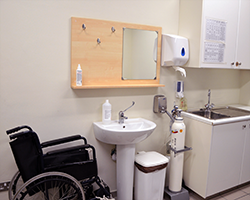Serbia first country in Region to complete situational analysis of WASH in health care facilities

WHO/Sara Barragán Montes
A prerequisite for high-quality health care is the provision of safe water, sanitation and hygiene (WASH) services and adequate waste management in all health care facilities. This prevents infections and thus protects both patients and health care workers, as well as safeguarding maternal and newborn health. Towards this goal of achieving and maintaining high-quality health care, Serbia is the first country in the WHO European Region to conduct a comprehensive analysis of the national status of WASH in health care facilities, using indicators recommended by WHO and the United Nations Children’s Fund (UNICEF). In doing so, Serbia also becomes one of the first countries to make a concrete response to the World Health Assembly (WHA) resolution on WASH in health care facilities, adopted in 2019 at its 72nd session.
Responding to the WHA resolution on WASH in health care facilities
Resolution WHA72.7 stresses the fundamental importance of adequate WASH services in achieving universal health coverage and re-emphasizes attainment of the WASH-related commitments underpinned by Sustainable Development Goal (SDG) 3 on good health and well-being and SDG 6 on clean water and sanitation. The WHA resolution calls upon Member States to improve WASH in health care facilities through conducting, among other actions, comprehensive national assessments, on the basis of which country-tailored priority actions can be identified and implemented.
WASH services are also of high importance for the preparedness of health care facilities for outbreaks and pandemics. In 2020, many countries across the world have faced great challenges in dealing with the COVID-19 pandemic. The provision of safe water and sanitation services, as well as frequent and correct hand hygiene, are essential for protecting human health during public health emergencies such as infectious disease outbreaks, including COVID-19.
Indicators for monitoring progress
The WHO/UNICEF Joint Monitoring Programme for Water Supply, Sanitation and Hygiene developed a set of core indicators for monitoring progress on the provision of WASH in health care facilities, in line with SDG 6 targets for universal and equitable access to WASH for all. Reflecting evidence-based WHO guidelines and national requirements, countries that have reached a good coverage of basic services are encouraged to develop further.
The Serbian assessment collected evidence on the WASH conditions in health care facilities to identify gaps in implementation of the national requirements, to evaluate the routine monitoring system, to assess financing needs, and to inform the development of advanced service levels and associated indicators. The results of the study have already stimulated dialogue across departments, strengthening collaboration among WASH, infection prevention and antimicrobial resistance.
Based on this success, WHO/Europe is now working with other Member States conducting their own assessments, which will ultimately contribute to a solid evidence-based overview of the state of, and trends in, WASH in health care facilities across the Region.



